

Calm.com. 6 Breathing Exercises to Relax in 10 Minutes or Less. Don’t wait until fight or flight kicks in before minding your breath.
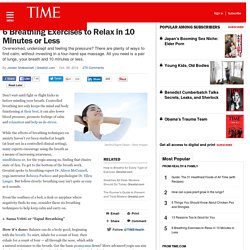
Controlled breathing not only keeps the mind and body functioning at their best, it can also lower blood pressure, promote feelings of calm and relaxation and help us de-stress. While the effects of breathing techniques on anxiety haven’t yet been studied at length (at least not in a controlled clinical setting), many experts encourage using the breath as a means of increasing awareness, mindfulness or, for the yogis among us, finding that elusive state of Zen.
To get to the bottom of the breath work, Greatist spoke to breathing expert Dr. Alison McConnell, yoga instructor Rebecca Pacheco and psychologist Dr. Coping Statements For Anxiety. Purpose: to put a stop to the thoughts that lead to anxiety, and to replace those thoughts with realistic, rational thoughts.
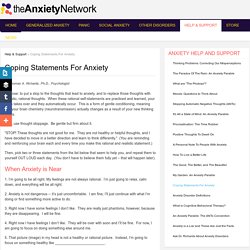
When these rational self-statements are practiced and learned, your brain takes over and they automatically occur. This is a form of gentle conditioning, meaning that your brain chemistry (neurotransmission) actually changes as a result of your new thinking habits. First, use thought stoppage. Be gentle but firm about it. "STOP! What To Do If A Friend Has Bulimia. Courtesy of Polly Mertens of GetBusyThriving.com Welcome beautiful, loving YOU.

Do you know that you are? You wouldn’t be reading this if you didn’t care for your friend and deep inside want them to be healthy and happy. You are a wonderful human being that has the capacity to help other people learn to see themselves as beautiful. An estimated 1 in 4 women in college have an eating disorder and up to 80% of women exhibit signs of an eating disorder at some stage of their life. Helping a Friend with an Eating Disorder - Caltech Counseling Center. This article was written to help you identify the signs of an eating disorder and give you some guidance on how to help a friend who suffers from either anorexia or bulimia.
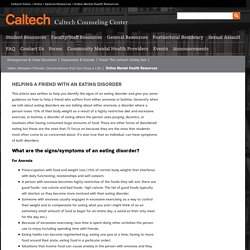
Generally when we talk about eating disorders we are talking about either anorexia, a disorder where a person loses 15% of their body weight as a result of a highly restrictive diet and excessive exercise, or bulimia; a disorder of eating where the person uses purging, diuretics, or laxatives after having consumed large amounts of food. There are other forms of disordered eating but these are the ones that I’ll focus on because they are the ones that students most often come to us concerned about.
It’s also true that an individual can have symptoms of both disorders. For Anorexia A person who is really involved in their anorexia will look undernourished, which they are, though they don’t see it. Bulimia Nervosa: Signs, Symptoms, Treatment, and Help. Helping Someone in Crisis. Sometimes depression and bipolar disorder have symptoms that can best be helped by inpatient psychiatric treatment.
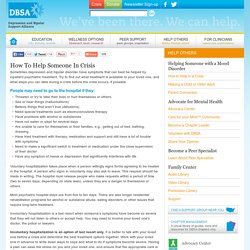
Try to find out what treatment is available to your loved one, and what steps you can take during a crisis before the crisis occurs, if possible. People may need to go to the hospital if they: Suicide Prevention: How to Help Someone who is Suicidal. If you're thinking about committing suicide, please read Suicide Help or call 1-800-273-TALK in the U.S.!
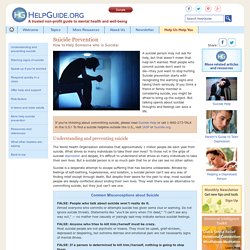
To find a suicide helpline outside the U.S., visit IASP or Suicide.org. Understanding and preventing suicide The World Health Organization estimates that approximately 1 million people die each year from suicide. What drives so many individuals to take their own lives? To those not in the grips of suicidal depression and despair, it's difficult to understand what drives so many individuals to take their own lives. Suicide is a desperate attempt to escape suffering that has become unbearable. Common Misconceptions about Suicide FALSE: People who talk about suicide won't really do it. FALSE: Anyone who tries to kill him/herself must be crazy. Helping Someone with an Eating Disorder: Advice for Parents, Family Members, and Friends. Understanding eating disorders Eating disorders involve extreme disturbances in eating behaviors—following rigid diets, bingeing on food in secret, throwing up after meals, obsessively counting calories.
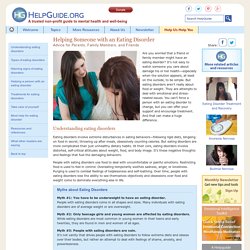
But eating disorders are more complicated than just unhealthy dietary habits. At their core, eating disorders involve distorted, self-critical attitudes about weight, food, and body image. It’s these negative thoughts and feelings that fuel the damaging behaviors. People with eating disorders use food to deal with uncomfortable or painful emotions.
Help Others - Friends and Family. Mood disorders such as depression and bipolar disorder affect millions of people.
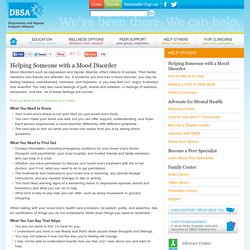
Helping a Depressed Person: How to Reach Out and Help Someone While Taking Care of Yourself. Helping a depressed friend or family member Depression is a serious but treatable disorder that affects millions of people, from young to old and from all walks of life.
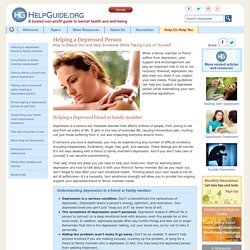
It gets in the way of everyday life, causing tremendous pain, hurting not just those suffering from it, but also impacting everyone around them. If someone you love is depressed, you may be experiencing any number of difficult emotions, including helplessness, frustration, anger, fear, guilt, and sadness. These feelings are all normal. It’s not easy dealing with a friend or family member’s depression. National Eating Disorder Information Centre (NEDIC) Helping Someone Manage Depression. Helping Someone Manage Depression Medical professionals often remark on how helpful family members and friends can be in reporting changes in depressed patients' symptoms and ensuring that patients consistently take their prescribed medication.
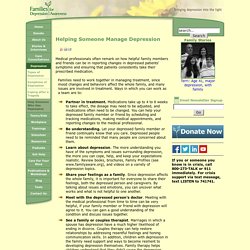
Families need to work together in managing treatment, since mood changes and behaviors affect the whole family, and many issues are involved in treatment. Ways in which you can work as a team are to: Partner in treatment.